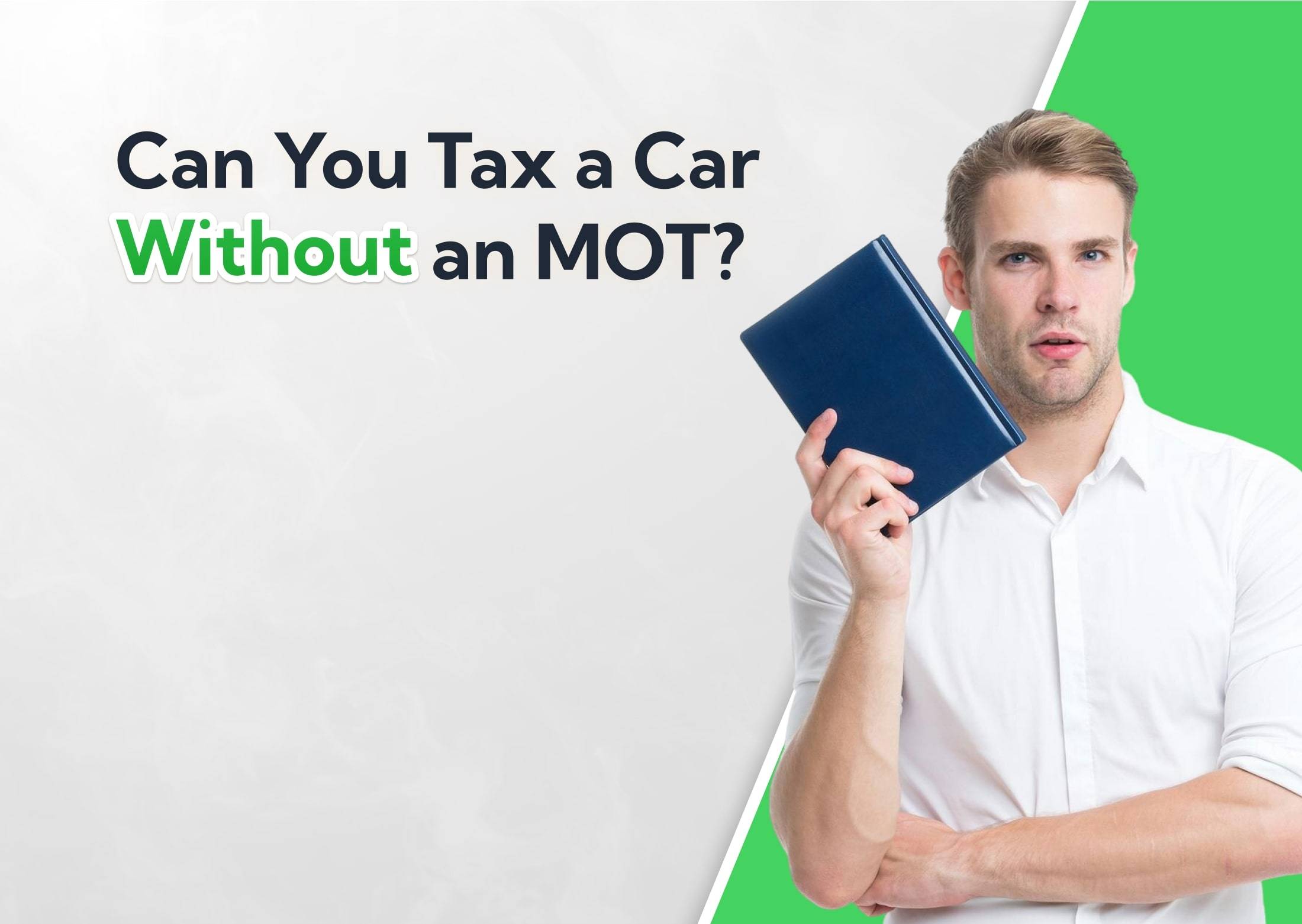Can You Tax a Car Without an MOT?
You cannot tax a car without a valid MOT, unless it’s newer than three years, exempt, or you’re driving it to a pre-booked MOT test. In this guide, I’ll explain the DVLA rules, exceptions for classic cars and what to do if your MOT has expired. That way, you stay road-legal and avoid penalties.
Last updated: 23rd October, 2025

Award-winning CEO driving growth and social impact across automotive, recycling, and technology-led enterprise platforms.

Listen to this story
Road tax and your MOT certificate. Two things you can't live without as a car owner (or lessee) in the UK.
Before you drive on public roads, you have to pay Vehicle Excise Duty (VED), no matter what you drive. And if your car's older than three years and isn't otherwise MOT-exempt, you also need to make sure it has a valid MOT certificate. For the average motorist, it's illegal to drive without an MOT.
However, what happens if you are in the process of getting your car's MOT done and its current one has already expired? Can you still tax your car without an MOT?
The answer is not entirely straightforward, as it depends on certain factors.
What's in this article
- 1. Can I tax my car if it doesn't have a valid MOT?
- 2. Can I tax my car online without an MOT certificate?
- 3. Why MOT and Car Tax Are Linked in the UK
- 4. What exceptions allow you to tax a car without an MOT?
- 5. How soon can I tax my car after getting a new MOT?
- 6. Can I drive my car to an MOT test without road tax?
- 7. Step-by-Step Process If Your MOT Has Expired
- 8. The consequences of driving without car tax or MOT
- 9. What should I do if my car fails its MOT after I've taxed it?
- 10. How long does car tax last?
- 11. Documents needed to tax your car
- 12. Checking your car's MOT status
- 13. Best Practices to Keep MOT and Tax Aligned
- 14. The bottom line
Can I tax my car if it doesn't have a valid MOT?
No, you cannot tax your car in the UK if it doesn't have a valid MOT. The UK government requires every vehicle to have a valid MOT certificate in order to be taxed.
The MOT certificate proves the vehicle meets the government's minimum road safety and environmental standards. Without it, the vehicle is not roadworthy.
In fact, it's not possible to tax your car without a valid MOT certificate, and driving without either could void your insurance policy. If you're involved in an accident without an MOT, your insurer almost certainly won't cover you.
Can I tax my car online without an MOT certificate?
With the DVLA's online system, taxing your car is an easy process. All you have to do is provide your vehicle's registration number and the reference number from your V5C logbook.
However, the online service won't allow you to tax your car without a valid MOT certificate. The system shares data with the MOT database and will automatically check whether the vehicle has a current MOT before allowing you to tax it.
Why MOT and Car Tax Are Linked in the UK
So, in answer to the question “Can I tax a car without an MOT?”, the answer is no. Let’s look at why. The DVLA (Driver and Vehicle Licensing Agency) is responsible for managing MOT records and vehicle tax, and it uses interlinking electronic systems to do so. As a result, you can’t tax your vehicle unless the database shows that there’s a valid MOT in place.
- The rationale here is based on three things from the DVLA perspective: safety, fairness and efficiency.
- The MOT confirms that your car is safe and has met minimal standards for legal safety and environmentalism. If your car doesn’t pass its MOT, it isn’t roadworthy.
- If it were possible to tax a car that has failed its MOT, it would let unroadworthy vehicles circulate and cause problems for the entire system.
The linked system approach also helps to deliver compliance and reduces administrative errors.
The best way to remember it is to think about the MOT as more than just safety. It’s also the access point for other legal car admin like paying tax.
What exceptions allow you to tax a car without an MOT?
The only times you can tax a car without an MOT are when:
- The vehicle is under three years old
- It's MOT-exempt
You'll even need to tax your car if it's a classic car (over 40 years old). Classic car tax exemption only means you don't need to pay road tax — the vehicle still needs an MOT and you still have to go through the formal taxing process.
How soon can I tax my car after getting a new MOT?
To tax your vehicle, you need to have an MOT certificate valid on the day you tax it. So, if your car's most recent MOT expires, you have to get the new MOT and then tax the vehicle immediately.
It's illegal to drive a car without paying vehicle tax, so you need to tax the vehicle before even driving it off.
That's why it's always a good idea to book your MOT at a test centre well in advance. That way, you won't run into the problem of being unable to tax your car because its MOT has expired.
Can I drive my car to an MOT test without road tax?
Yes. If you're on your way to a pre-booked MOT appointment, you can legally drive on public roads without an MOT certificate or road tax. However, you must take the most direct route to the test centre and have proof of your appointment in case you're in an accident or get pulled over by the police.
What the experts say

Anthony Sharkey
Step-by-Step Process If Your MOT Has Expired
Ah, that sinking feeling when you realise your MOT has expired and you’ve not lined up your test! Take action quickly so you don’t end up with a car you can’t drive. This is what you need to do.
How to Renew MOT Before Applying for Tax
The key thing is to book your MOT test at the earliest opportunity, at a nearby garage. Drive to the centre for your MOT test, which you’ve prebooked. These conditions will mean that the journey is legal. However, If you drive elsewhere before heading to the test centre from your home, you will be driving illegally.
Once the garage has carried out the MOT and passed it, they will add the details to the DVLA system, which updates instantly. You’ll also get a paper copy printout of the MOT pass confirmation. If your car doesn’t pass its MOT, the garage will let you know what work needs to be done.
Sometimes an MOT failure is as simple as a lightbulb or windscreen wiper that needs replacing. This is quick and easy to do, and they will usually do a free retest there and then. However, if there is more significant work to do to pass the MOT, they may not be able to do it instantly. In this case, they will need to keep the car and complete the work. You will not be able to drive it around.
Asking how to tax a car? Once your car has passed its MOT, you can arrange car tax either online, at the Post Office or by phone.
Using Online MOT Check Tools
It’s quick and easy to use the Car.co.uk FREE online MOT checker. Use it to check the MOT status and history on your vehicle, or any car you’re thinking about buying. The free MOT test checker will give you full information on:
- The current MOT status for the vehicle
- The date that the MOT test is due
- The result of the last MOT, including issued advisories
- The mileage recorded at the last test
- If any MOT test certificate has been refused, and the reasons why.
How to Book a Test and Legally Drive to the MOT Centre
The key thing is to prebook the test and not just drive to a garage on the off-chance they might fit you in. This is illegal. You must contact your chosen, nearby garage, book your MOT and receive confirmation of the MOT appointment, ideally by SMS or email. Keep this confirmation in case the police stop you and query your journey.
When you have the MOT, drive directly to it, without any detours.
The consequences of driving without car tax or MOT
If you choose to drive without tax and/or an MOT, you're putting yourself at risk of fines and other penalties. In addition, driving without proper taxation can result in your car being clamped, towed away, or even crushed.
Automatic number plate recognition (ANPR) cameras — which there are thousands of throughout cities in the UK — can easily detect untaxed vehicles. When you drive through one, it automatically checks your vehicle registration against the DVLA's records.
Here's an overview of what could happen to you, depending on the severity of your situation:
- If you fail to tax your vehicle on time without declaring it a SORN (Statutory Off Road Notification), the DVLA will impose a Late Licensing Penalty. This is a fixed penalty of £80, halved if you pay within 28 days.
- If you're caught driving without Vehicle Excise Duty (tax), you will be fined £30 plus 1.5 times the outstanding tax amount. If you don't pay it, the fine eventually grows to £1,000 or five times the tax outstanding, whichever is higher.
- Driving without a valid MOT can also lead to a fine of up to £1,000. If your vehicle is found to be in a dangerous condition (classified as having 'dangerous' defects during the MOT test), you could face a fine of up to £2,500, receive three penalty points on your licence, and potentially be banned from driving.
- You may also get up to three points on your licence, depending on the condition your car is in. After 12 points, your driving licence will be revoked.
Driving without an MOT also voids your insurance policy in most cases. It's an offence to drive without car insurance as well, meaning you could face additional fines for that.
Not to mention, you're in for a world of problems if you're involved in an accident without an MOT. Since your insurer won't pay out any claims, you'll be left to handle the damages and legal battle on your own.
What should I do if my car fails its MOT after I've taxed it?
First, the MOT test centre will issue a VT30 'Refusal of an MOT Test Certificate,' which lists the reasons your car failed. The nature of the failure (whether it's classified as a 'dangerous' or 'major' defect) will determine your next steps.
- Dangerous defects: If your car has dangerous defects, it is illegal to drive it on the road except to a pre-arranged MOT appointment or directly to a garage for repairs. Driving a car with dangerous defects can result in a fine, penalty points, or even prosecution if caught.
- Major defects: If the defects are not dangerous, you can still drive your vehicle to be repaired or to a pre-arranged MOT test as long as your current MOT certificate is still valid.
Your car tax remains valid even if your car fails its MOT. However, since the vehicle is unroadworthy from that point on, we don't advise using it until it passes the retest.
You should have the necessary repairs completed as soon as possible. If you return the car to the same test centre within 10 working days, you may be eligible for a partial retest at a reduced fee. Lots of garages offer a free retest if the repairs are done on-site.
If you believe your car failed the MOT unfairly, you can appeal the result. However, you must keep the car in the same condition as it was during the test, and you will need to submit an appeal to the Driver and Vehicle Standards Agency (DVSA) within 14 days.
How long does car tax last?
Car tax can last up to 12 months, after which you need to renew it. You'll usually get a vehicle tax reminder (V11 letter) from the DVLA when your car tax is about to expire.
If your MOT expires but your car tax hasn't, you can request a car tax refund for the remaining full months' tax. You cannot drive it or leave it parked on a public road until you have a new MOT certificate and renew your car tax.
If you're going to do this, you have to declare your vehicle a SORN. The same goes for if you decide to scrap your car.
Documents needed to tax your car
The V5C logbook is the primary document you need to tax your car. You will need the 11-digit reference number from your V5C to complete the vehicle tax process online, by phone, or at a Post Office.
If you’ve received a V11 reminder letter from the DVLA, you can use the reference number provided in that letter to tax your vehicle. And if you’ve recently purchased a used vehicle, you can use the green “new keeper” slip (V5C/2) from the V5C logbook to tax the vehicle until you receive the full V5C document.
While the process is now digitised (so you won't need a physical copy), your vehicle must have a valid MOT certificate at the time you tax it as well.
You also need car insurance to tax your car. The DVLA will auto-check the Motor Insurance Database (MID) to confirm you've insured it. While you probably won't have to present the insurance certificate physically, your vehicle must be covered to complete the tax process.
Be prepared to pay the vehicle tax using a debit or credit card if doing it online or by phone (if you don't already use Direct Debit). If you’re taxing the vehicle at a post office, you can also pay by cheque or cash.
Checking your car's MOT status
If you're unsure when your MOT expires, use our free online MOT checker tool to view your car's MOT status and history.
The process is simple:
- Navigate to our MOT checker tool.
- Enter your car's registration number
- Click "Check MOT & MOT history".
- View your vehicle details, including when the current MOT expires.
Best Practices to Keep MOT and Tax Aligned
The key to keeping your MOT and tax up to date is to be organised! It’s just not worth the stress of leaving everything to the last minute.
Renew MOT Early to Avoid Gaps
You can get your MOT up to one month (less a day) before your existing certificate expires. Do it this way, and you won’t be cut short on your next certificate’s full year. Doing it early also means you won’t risk delaying your tax renewal.
Set MOT Reminders Alongside Tax Dates
The DVLA offers free reminders by text or email, so sign up to them to get alerts about when your MOT’s due. Diary it ahead in your calendar and look for other opportunities for alerts. For example, some road rescue apps like the RAC show you when your tax and MOT is due and some insurers send out alerts too if you request them.
It’s wise to keep up to date with car tax changes, MOT requirements and auto industry news in general.
Keep Insurance, MOT, and Tax Cycles in Sync
It can mean an expensive month, but if you align your insurance, MOT and tax cycle in sync, you’ll find it easier to get all your admin done at once. To lessen the financial blow, work out how much everything is likely to cost, split the cost over a year and make a transfer into a car admin savings account each month.
Alternatively, you can pay your car tax monthly or every 6 months, although there is a 5% surcharge for doing so. You can pay your insurance monthly too, but check that you’re happy with the interest fee.
The bottom line
Car tax is an essential part of vehicle ownership. It is a legal requirement that you must have before driving your car on public roads. Make sure your car has a valid MOT certificate and insurance before taxing it, and keep track of when your tax is due to avoid penalties or fines.
Frequently asked questions
Yes, you can tax a car on any day that the MOT is valid, even if it’s just by a day. (We don’t recommend that level of ‘flying by the seat of your pants’ though.
Yes, so long as the MOT appointment is prebooked (and you can evidence it with a test message, email or similar if you’re stopped by the police), and so long as you have insurance in place.
You must also drive directly to the test centre and not divert to do your grocery shopping, grab a coffee with a friend, throw in a gym session, or pick up some DIY essentials en route. Straight to the MOT test centre!
If you have a vehicle over 40 years old, it’s classed as a classic or historic car and it’s exempt from MOT requirements (so long it hasn’t been majorly modified.) Whether it’s worth keeping your current car for 40 years to avoid MOT duties is another matter.
Yes. You don’t need an MOT to SORN a car, because you’re taking it off the road.
Your vehicle’s up to date, and the DVLA is pleased with you. However, you need to also get the MOT done before you can drive it.
So long as you’re driving directly to a pre-booked appointment, you’re OK. But have that booking confirmation with you as evidence in case you get challenged.
Usually insurance remains valid as you make the legal journey, described above, to the MOT test centre. However, if you get to the test centre and the car fails its MOT, the insurance may be limited or denied until the necessary works are done and the car’s retested and passes.
In this instance, your car is probably staying at the garage, and you may face a long walk home.
Good question. Imports can be an interesting area when it comes to car admin. The answer is, yes, unless they qualify as new cars and are under three years old from registration. In this case, they don’t need an MOT.
You can renew your MOT up to one month, less than one day, before it's due. This will ensure you don’t shorten the certificate validity unnecessarily and give you maximum value.
About Car.co.uk

Share on
Latest news & blogs










